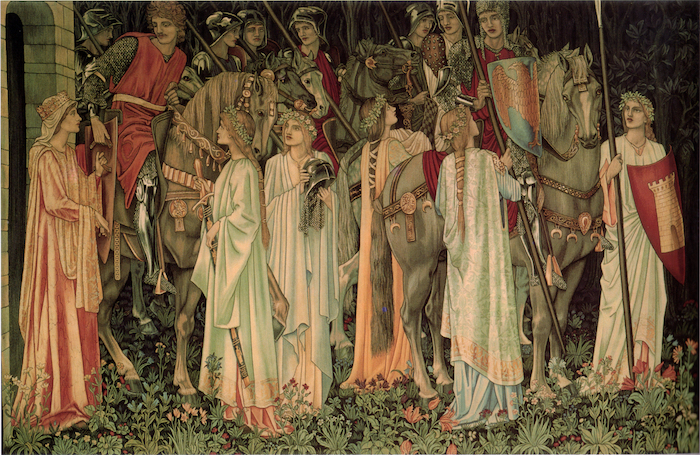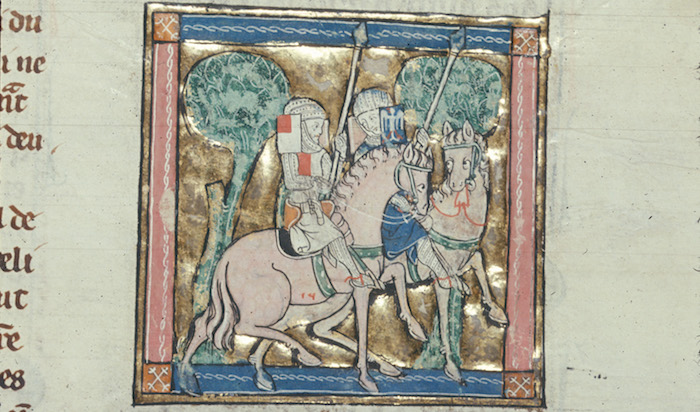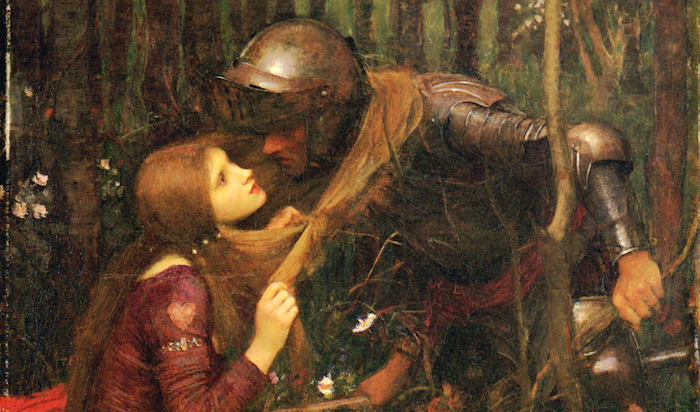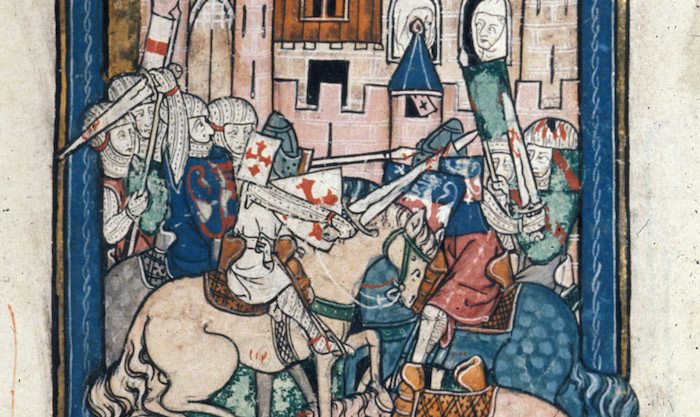One of my favorite things to do as a GM is to set my players against a problem I don’t have a solution for. The answers they come up with are always cooler than mine, and the lack of a prescribed solution guarantees they’re engaging in fun, creative problem-solving, rather than playing ‘guess-what-Tristan-is-thinking’. Medieval stories of King Arthur and his Knights of the Round Table are a great mine for such puzzles: impossible tasks the brave knights must attempt, and the clever solutions they devise.
To get players to attempt an ‘impossible’ task, you have to make clear that trying the impossible really might be their best approach. For example, in Culhwch and Olwen (ca. 11th-12th century), the King of Giants gives Culhwch a host of impossible tasks to complete before the he will let Culhwch marry the Giant princess. The tasks may be ‘impossible’, but without the permission of the father of the bride, a wedding simply can not be accomplished in the religious/folkloric context of the story. There’s ‘impossible’, and then there’s impossible, and you should make clear to your players what kind your puzzle is.
That said, here are four impossible puzzles and their solutions!

Un-Sowing a Field
One of the tasks the King of Giants gives Culhwch in Culhwch and Olwen is to un-sow a field. The giant points Culhwch to a barren field. He tells the hero, “When I first met the mother of your intended, nine baskets of flax seed were sown in that field. In all the years since, not a single flax plant has grown there. I want you to get me back those seeds.” Culhwch’s solution? He gets some help from folks for whom the task is not impossible. First, he gets the other knights of Arthur’s court to lend him a hand. Then, while Gwythyr, one of the knights, is traveling to help Culhwch with a different impossible task, Gwythyr hears some terrible wailing and moaning. The sound is coming from an anthill that is somehow on fire(?!). Gwythyr cleaves the anthill from the ground with his sword, which somehow puts out the fire (look, I didn’t write this story, OK?). The ants are so grateful to Gwythyr for saving them that they offer to move anything he wants. Gwythyr points them to the King of Giants’ barren flax field, and the ants crawl into the soil to retrieve all the seeds except one – which a lame ant brings in before nightfall.

Crossing the Perilous Ford
No knight has ever crossed the Perilous Ford. Its banks are sheer and high. Its waters run deep and fast. Indeed, this ford is the reason no knight born of woman has ever crossed the Galloway frontier and returned alive. And yet, people say that the knight who first crosses the Perilous Ford will be the best in the world. In Chrétien de Troye’s Perceval (ca. 1180), the Haughty Maid of Logres dares her brother, Sir Gawain, to cross it. Gawain knows every knight who has attempted the ford has been swept out to sea and drowned. But, alas, he cannot refuse a dare. His solution? He jumps the ford on horseback. He almost doesn’t make it (and it would require quite the roll for a PC), but his success frustrates the wicked Haughty Maid – who was trying to kill him – and earns him the respect of Sir Guiromelant of Orqueneles on the other side.

The Beheading Game
This task appears in several stories, most notably Sir Gawain and the Green Knight (ca. 14th century). In the Gawain version, an enormous knight with green skin and hair, clad all in green, and riding a green horse, appears at Camelot one Christmastime. He roundly (but perhaps good-naturedly) insults the knights, then offers a ‘game’. He will kneel, bare his neck, and give one knight a free swing – provided that, at Christmastime next year, the same knight seeks him out to receive a free swing in return. It’s a most peculiar request. The stroke is sure to be lethal. How could the striker receive his due next year from a man he kills this year? But, after some goading from the Green Knight, Sir Gawain agrees, cuts off the man’s head – and gawps with astonishment when the Green Knight picks up his head, and gallops out of Camelot.
So how does bold Sir Gawain get out of this mess? By demonstrating honorable behavior! Gawain wanders for some time trying to find the Green Knight’s haunted chapel, and has some adventures along the way. In his adventures, he befriends a strange knight, Sir Bertilak, and spends several days at his castle. Gawain successfully resists being seduced three times by Sir Bertilak’s wife, but improperly accepts from her a gift that might save his life from the Green Knight. By New Year, Sir Gawain finds the Green Chapel and kneels in its haunted hall before his enormous adversary. The Green Knight swings to behead Gawain, but intentionally misses, only nicking the skin. The Green Knight then reveals himself to be Sir Bertilak, transformed by magic. The whole event was a scheme contrived by a sorceress to test the honor of Arthur’s knights. The nick was punishment for accepting the gift. Had Gawain done worse, the Green Knight/Sir Bertilak would have decapitated him fully. At your table, depending on the genre and tone of your campaign, ‘behave honorably and trust in fate’ may absolutely be a valid solution to a seemingly impossible task.

Hunting the Boar Twrch Trwyth
Closing with Culhwch and Olwen again, another of the King of Giants’ impossible tasks is to recover a comb and scissors that lie between the ears of the boar Twrch Trwyth. The beast is enormous and cunning. He was once a king, but was turned into this monster by God as punishment for his sins. The task of stealing from Twrch Trwyth is great and illustrative because the knights don’t come up with a clever solution to this problem. They ‘solve’ it with main force, and 24 named knights die in the process, most notably two kings and two of Arthur’s uncles. While the knights are ultimately successful, the whole thing is kind of a disaster.
As soon as Twrch Trwyth learns that Arthur and his knights are coming for him, the beast flees, moving from Ireland to Wales. There, he devastates the land. This is a serious problem for Arthur, because he’s just moved a terrible foe from someone else’s land to his own. The knights and the boar battle all across Wales. Wherever they go, Twrch Trwyth kills peasants, livestock, and knights. To keep the boar from entering England, Arthur has to summon all the men of Cornwall and Devon to do battle with the beast at the Severn River. All the gathered warriors manage to keep Twrch Trwyth occupied long enough that the knights can snatch the comb and scissors from the boar’s head, but the beast gets away into Cornwall, and causes even more devastation before he’s chased into the sea. As in a good campaign, choices have consequences in the Twrch Trwyth story. Arthur’s choice to use brute force to solve a problem he should have tackled with his legendary wisdom devastates his kingdom.






